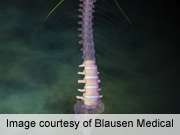(HealthDay)—The use of a Coflex interspinous device does not further improve outcomes beyond decompressive surgery for the treatment of symptomatic lumbar spinal stenosis (LSS), according to a study published online in the August issue of the Journal of Spinal Disorders & Techniques.
Alexander Richter, M.D., from the Spine Center Hamburg in Germany, and colleagues compared outcomes of decompressive surgery alone (31 patients) versus decompressive surgery with additional implantation of the Colfex interspinous device (31 patients) for the treatment of symptomatic LSS. Disability and pain scores were measured both preoperatively and postoperatively (at three, six, 12, and 24 months).
The researchers found that in both groups there was significant improvement (P < 0.001) in the scores of the Oswestry Disability Index, the Roland-Morris Disability Questionnaire, the Visual Analog Scale, and the pain-free walking distance at all follow-up points versus baseline. No significant differences were seen in ascertained parameters, including patient satisfaction and subjective operation decision, up to two years after surgery.
"The results of this first prospective controlled study indicate that the additional placement of a Coflex interspinous device does not improve the already good clinical outcome after decompressive surgery for LSS in the 24-month follow-up interval," the authors write.
More information:
Abstract
Full Text (subscription or payment may be required)
Copyright © 2014 HealthDay. All rights reserved.























